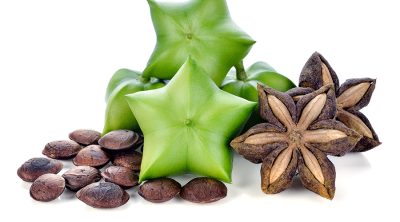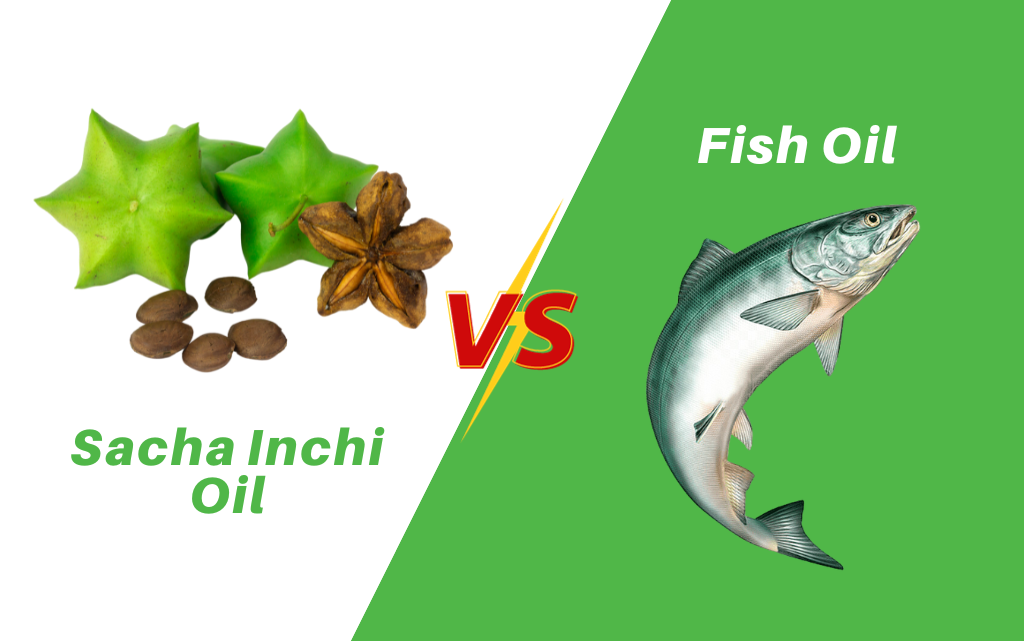Sacha Inchi and Fish oil have been getting more attention lately as to which dietary supplement is superior. However, both oils provide essential healthy fats: Omega-3 (α‐Linolenic acid, ALA), Omega-6 (linoleic acid, LA), and Omega-9 (Oleic acid).
What is Sacha Inchi?

Sacha Inchi (Plukenetia volubilis L.) is a plant that comes from Peru country, known as ‘Sacha Peanut’, ‘Inca Peanut’, or ‘Mountain Peanut’. This plant is native to South America and the Caribbean. However, traditionally the edible seeds are consumed by groups in Peru. The fruit of Sacha Inchi produces large, edible seeds. The seeds are normally processed into fine powder by grounding, roasted, or oil extraction. Sacha Inchi oil can be used in cooking or added to the formulation of skin care products [1].
Why Sacha Inchi is Important
The Sacha Inchi plant has gained popularity as numerous clinical studies have reported the benefits of consuming Sacha Inchi as a daily health supplement. Sacha Inchi may help improve cholesterol levels [1]. According to a few studies, the consumption of Sacha Inchi supplements has been shown to reduce total serum cholesterol and bad cholesterol within a span of 2 months [7]. Another study also found that Sacha Inchi improves digestion by promoting a balance of beneficial bacteria in the gut [1].
What is Fish Oil?

Fish oil is widely recognized for its benefits as a dietary supplement that provides rich sources of Omega. Fish oils are obtained from the tissues or liver of marine fishes, such as tuna, salmon, mackerel, and cod fish. Omega-3 makes up about 30% of fish oil extraction and the remaining 70% are from other types of fats [2]. According to the World Health Organization (WHO), it is suggested to consume 1-2 servings of fish a week [6].
Opting for oily fish such as salmon, tuna or mackerel can supply our body with essential fats, contributing to improvements in heart and skin health [2]. In addition to Omega-3, fish oil also has anti-inflammatory properties. Individuals experiencing inflammatory conditions such as joint pain, swelling, or redness may find it beneficial to consume it [2].
Sacha Inchi or Fish Oil is better?
With an increasing focus on health, many people are turning to dietary supplements as daily boosters to improve their well-being. The supplement trend in the market has also grown in size and the supplement industry has come up with many forms such as plant-based, immune boosting, personalized supplements, and many more [3]. Consequently, individuals are seeking the best supplement in the market.
The nutritional composition of Sacha Inchi is known to have 17 times greater omega compared to fish oil. Around 46.8–50.8% of Omega-3 is found in Sacha Inchi oil. Followed by 33.4–36.2% of Omega-6 and 8.7–9.6% of Omega-9. However, Sacha Inchi oil does not provide EPA (Eicosapentaenoic acid) and DHA (Docosahexaenoic acid). It only contains a precursor, alpha-linoleic in larger quantities, which may, in turn, yield more EPA and DHA in the body.
In contrast, fish oils, widely known and consumed for decades, have been the top preference of consumers due to their great source of Omega-3 properties (EPA and DHA). They are readily available, and direct conversion of EPA and DHA in the body is possible [2].
Sacha Inchi: An Alternative Option
Nevertheless, the advantage of choosing Sacha Inchi over fish oil is that it is suitable for vegetarians or vegans. As Asia is 4 of the top 5 global vegetarian markets, it is believed that people are transitioning to a healthier diet lifestyle by consuming more plant-based diets [4]. Therefore, Sacha Inchi oil can be an excellent option to fish oil as a new trend of plant-based supplement.
Besides, there is a significant concern regarding fish allergies and Omega-3. There is documented evidence of an individual experiencing severe allergic reactions after consuming a fish oil supplement [7]. Therefore, plant-based supplements serves a great alternative to replace fish oil supplements.
To conclude, the sources of Omega-3 from Sacha Inchi and fish oil differ. Sacha Inchi oil has more of a certain compound, as does fish oils. Neither is necessarily “better” than the other. Choosing between two sources of options depends on individual preferences, dietary lifestyle, and specific needs. For individuals who are on a plant-based diet, and suffer from seafood allergy is more suitable to opt for Sacha Inchi oil supplement. On the other hand, individuals with no dietary restrictions and rarely consume fish in their daily meals may find fish oil supplements a convenient way to ensure an adequate intake of essential fats
References
- Sacha Inchi
https://www.healthline.com/nutrition/what-is-sacha-inchi#what-is-it
- Fish Oil
https://www.healthline.com/nutrition/benefits-of-fish-oil#about-fish-oil
- Plant Based Supplement
- Vegans
5. Fish and Omega-3 FA
https://www.heart.org/en/healthy-living/healthy-eating/eat-smart/fats/fish-and-omega-3-fatty-acids
6. Efficacy of oral administration of sacha inchi oil
Gonzales, G. F., & Gonzales, C. (2014). A randomized, double-blind placebo-controlled study on acceptability, safety and efficacy of oral administration of sacha inchi oil (Plukenetia volubilis L.) in adult human subjects. Food and Chemical Toxicology, 65, 168–176.doi:10.1016/j.fct.2013.12.039
7. Fish Allergies and Omega-3
https://www.verywellhealth.com/fish-allergy-and-omega-3-supplements-1324477

